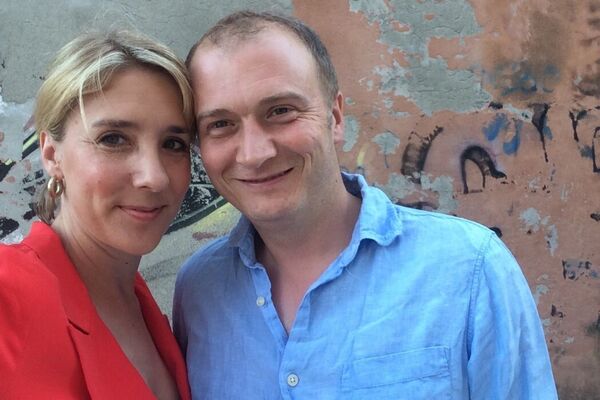Chris' story: Soft tissue sarcoma
Chris was diagnosed with soft tissue sarcoma four months after finding a lump under his arm in 2013. Just two short years later, he passed away, aged just 42. He devoted the end of his life to finding answers for others living with sarcoma and believed that genetic research was the way forward.

About sarcoma
Sarcomas are uncommon cancers that can affect any part of your body. Over 100 different subtypes of sarcoma exist. Prognosis hasn’t improved over the past 40 years.
About 15 people
are diagnosed with sarcoma every day in the UK
Just 1%
of the UK's cancers are sarcoma
3 in every 200
people with cancer in the UK have sarcoma
Chris’ story

Chris Martin and his wife, Zoe Conway.
When Chris Martin was told in 2013 he had sarcoma, a rare form of cancer, he assumed that after treatment that he had a good chance of making a full recovery.
But despite being relatively young and undergoing nine rounds of chemotherapy and an operation to remove the tumour under his arm, two years later, in October 2015, doctors told him that the cancer had returned and Chris had just weeks to live.
He died at the Royal National Orthopaedic Hospital, London, on November 25, 2015, aged just 42, six days after marrying fiancée Zoe Conway at his hospital bedside.
Dedicated to finding answers
In a cruel twist of fate, at the time of his death, he was principal private secretary to the then Prime Minister David Cameron as he spearheaded the creation of a ground-breaking project to create the world’s largest research and data resource for rare diseases and cancer.
The initiative’s goal was to harness whole genome sequencing technology to uncover new diagnoses and improved treatments for patients.
Launched in 2012 in partnership with the NHS and participants, The 100,000 Genomes Project would sadly come too late to benefit Chris. Since his death his wife Zoe, Chris’ family, and a dedicated group of his high-profile friends including politicians Rt Hon Ed Balls and Baroness Liz Sugg and have continued to raise funds for research in his name, for charity Sarcoma UK.
Using participant samples donated as part of the 100,000 Genomes Project, money raised has been used to fund research into faster diagnosis and creating personalised medicine for sarcoma patients.
Established and managed by Genomics England, the resulting National Genomic Research Library now has genetic samples from 250,000 participants, of which 1,500 are from sarcoma tumours – making it the largest data library for this complex cancer in the world.
Still working towards improved diagnosis
The prognosis for the UK’s sarcoma patients has changed very little over the past 40 years, with a five-year survival rate of just 55%. Late diagnosis and the fact it is so rare, are key factors – it makes up just 1% of the UK’s cancers.[i]
Zoe said: “It took four months before Chris’ doctors knew it was sarcoma. Faster diagnosis and to know which drugs would be the most effective was what he needed, but it just wasn’t possible. Treatment felt ‘medieval’, it was a case of cut the tumour off, administer the chemotherapy and hope for the best. When you are as sick as Chris, you want to feel there are people ‘shooting for the moon’ for you but when the cancer returned, although the doctors tried everything, there was nothing they could do to save him. Chris said that so little was known about his cancer that he felt he had joined a queue to die.
“Sadly, any insights into sarcoma came too late for Chris. He decided that campaigning for more research into this awful disease and donating his tissue sample to the genomes project was the only way to change things and to help others.
“He was a much-loved husband, son and brother and was he was deeply respected in Whitehall as someone with integrity. David Cameron paid a moving tribute to him in the House of Commons just two hours after he died and he was in the front row at his funeral.
“After Chris died, it was an utterly devastating time – he was the great love of my life. We were both frustrated that there wasn’t more that could be done to save him, but I live in hope that the research will help to change things. We created the Chris Martin Fellowship in his memory to try to help other sarcoma patients that would come after him. Until we learn more about this terrible cancer, we won’t be able to improve what is often a bleak outlook for patients.”
[i] https://sarcoma.org.uk/about-us/stay-connected/for-journalists/